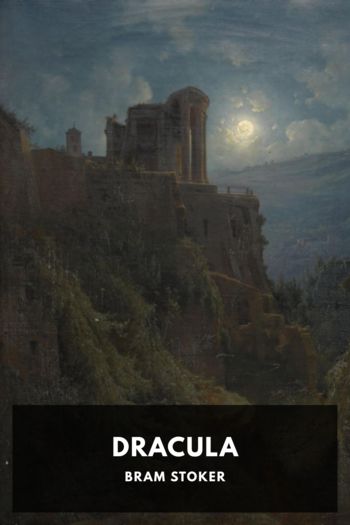Dracula by Bram Stoker (readnow TXT) 📕

Description
Dracula is one of the most famous public-domain horror novels in existence, responsible not just for introducing the eponymous Count Dracula, but for introducing many of the common tropes we see in modern horror fiction.
Count Dracula isn’t the first vampire to have graced the pages of literature—that honor is thought to belong to Lord Ruthven in The Vampyr, by John William Polidori—but Dracula is the vampire on which modern vampires are based.
Dracula wasn’t as famous in its day as it is today; readers of the time seemed to enjoy it as nothing more than a good story, and Stoker died nearly penniless. But its long-lasting influence is undeniable, and for all its age Dracula remains a gripping, fast-paced, and enjoyable read.
Read free book «Dracula by Bram Stoker (readnow TXT) 📕» - read online or download for free at americanlibrarybooks.com
- Author: Bram Stoker
Read book online «Dracula by Bram Stoker (readnow TXT) 📕». Author - Bram Stoker
30 September.—The stationmaster was good enough to give me a line to his old companion the stationmaster at King’s Cross, so that when I arrived there in the morning I was able to ask him about the arrival of the boxes. He, too, put me at once in communication with the proper officials, and I saw that their tally was correct with the original invoice. The opportunities of acquiring an abnormal thirst had been here limited; a noble use of them had, however, been made, and again I was compelled to deal with the result in an ex post facto manner.
From thence I went on to Carter Paterson’s central office, where I met with the utmost courtesy. They looked up the transaction in their daybook and letter-book, and at once telephoned to their King’s Cross office for more details. By good fortune, the men who did the teaming were waiting for work, and the official at once sent them over, sending also by one of them the waybill and all the papers connected with the delivery of the boxes at Carfax. Here again I found the tally agreeing exactly; the carriers’ men were able to supplement the paucity of the written words with a few details. These were, I shortly found, connected almost solely with the dusty nature of the job, and of the consequent thirst engendered in the operators. On my affording an opportunity, through the medium of the currency of the realm, of the allaying, at a later period, this beneficial evil, one of the men remarked:—
“That ’ere ’ouse, guv’nor, is the rummiest I ever was in. Blyme! but it ain’t been touched sence a hundred years. There was dust that thick in the place that you might have slep’ on it without ’urtin’ of yer bones; an’ the place was that neglected that yer might ’ave smelled ole Jerusalem in it. But the ole chapel—that took the cike, that did! Me and my mate, we thort we wouldn’t never git out quick enough. Lor’, I wouldn’t take less nor a quid a moment to stay there arter dark.”
Having been in the house, I could well believe him; but if he knew what I know, he would, I think, have raised his terms.
Of one thing I am now satisfied: that all the boxes which arrived at Whitby from Varna in the Demeter were safely deposited in the old chapel at Carfax. There should be fifty of them there, unless any have since been removed—as from Dr. Seward’s diary I fear.
I shall try to see the carter who took away the boxes from Carfax when Renfield attacked them. By following up this clue we may learn a good deal.
Later.—Mina and I have worked all day, and we have put all the papers into order.
Mina Harker’s Journal.
30 September.—I am so glad that I hardly know how to contain myself. It is, I suppose, the reaction from the haunting fear which I have had: that this terrible affair and the reopening of his old wound might act detrimentally on Jonathan. I saw him leave for Whitby with as brave a face as I could, but I was sick with apprehension. The effort has, however, done him good. He was never so resolute, never so strong, never so full of volcanic energy, as at present. It is just as that dear, good Professor Van Helsing said: he is true grit, and he improves under strain that would kill a weaker nature. He came back full of life and hope and determination; we have got everything in order for tonight. I feel myself quite wild with excitement. I suppose one ought to pity anything so hunted as is the Count. That is just it: this Thing is not human—not even beast. To read Dr. Seward’s account of poor Lucy’s death, and what followed, is enough to dry up the springs of pity in one’s heart.
Later.—Lord Godalming and Mr. Morris arrived earlier than we expected. Dr. Seward was out on business, and had taken Jonathan with him, so I had to see them. It was to me a painful meeting, for it brought back all poor dear Lucy’s hopes of only a few





Comments (0)